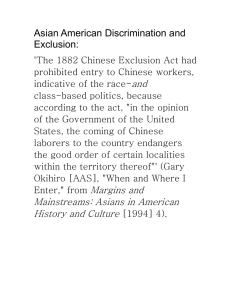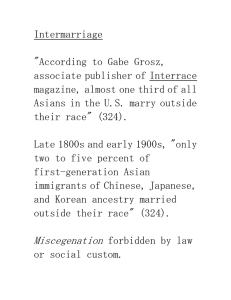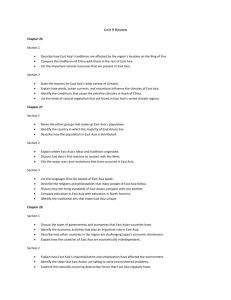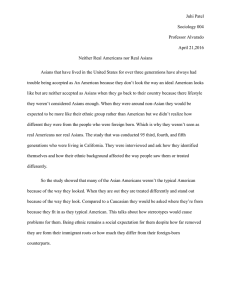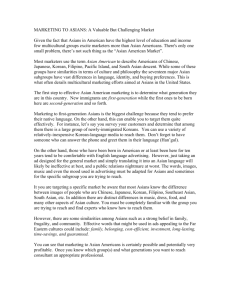asain or not.docx
advertisement
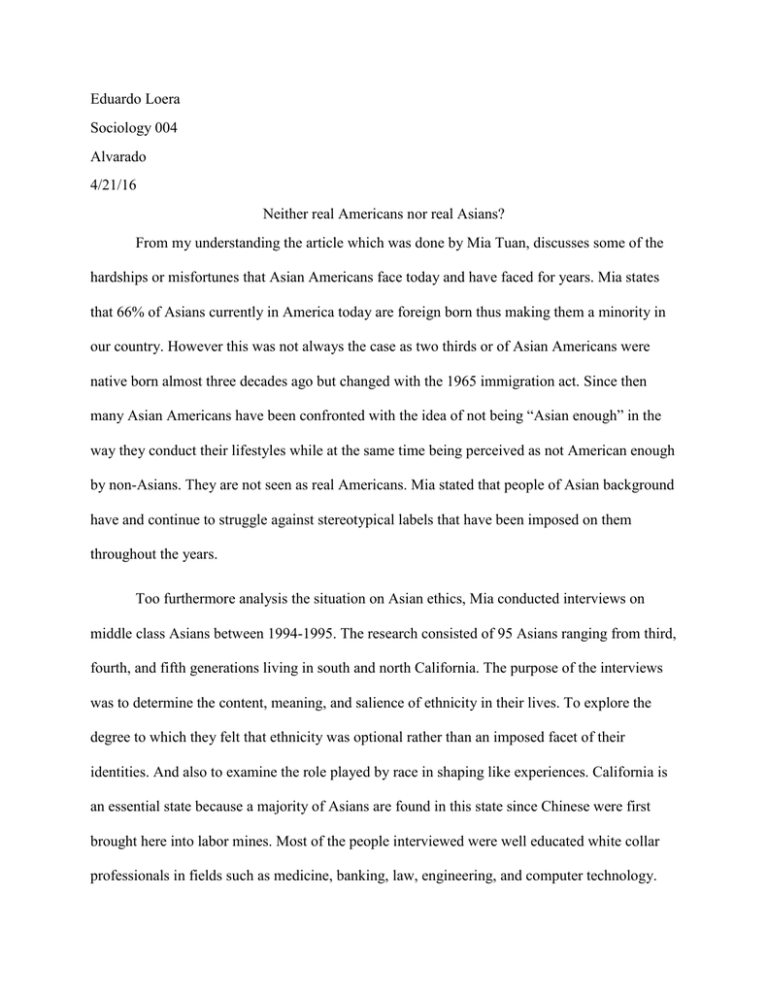
Eduardo Loera Sociology 004 Alvarado 4/21/16 Neither real Americans nor real Asians? From my understanding the article which was done by Mia Tuan, discusses some of the hardships or misfortunes that Asian Americans face today and have faced for years. Mia states that 66% of Asians currently in America today are foreign born thus making them a minority in our country. However this was not always the case as two thirds or of Asian Americans were native born almost three decades ago but changed with the 1965 immigration act. Since then many Asian Americans have been confronted with the idea of not being “Asian enough” in the way they conduct their lifestyles while at the same time being perceived as not American enough by non-Asians. They are not seen as real Americans. Mia stated that people of Asian background have and continue to struggle against stereotypical labels that have been imposed on them throughout the years. Too furthermore analysis the situation on Asian ethics, Mia conducted interviews on middle class Asians between 1994-1995. The research consisted of 95 Asians ranging from third, fourth, and fifth generations living in south and north California. The purpose of the interviews was to determine the content, meaning, and salience of ethnicity in their lives. To explore the degree to which they felt that ethnicity was optional rather than an imposed facet of their identities. And also to examine the role played by race in shaping like experiences. California is an essential state because a majority of Asians are found in this state since Chinese were first brought here into labor mines. Most of the people interviewed were well educated white collar professionals in fields such as medicine, banking, law, engineering, and computer technology. The interview showed that it is not as easy for Asians as it is for European immigrants to have the option and freedom to choose how they want to identify themselves. For Cathy Leong, one of the interviewers, she described herself as Asian-American due to the fact that she has a lot of Asians friends and coworkers and therefore since the majority of her friends are other Asians she feels more comfortable emphasizing Asian-American. For Emily Woo identifying herself is not as easy as she is half Chinese and half Japanese while at the same time being American. She says that by blood she is Chinese and Japanese but by culture she doesn’t know if she is much of either. For others like Tony, they are more assertive in how they identify themselves. He prefers the term American-Asian. The interviews concluded that for many it was hard to identify with just one ethnic group. For those who were asked why they wouldn’t identify themselves as simply Americans, answered that they couldn’t for the simple fact that they looked too different from the typical American. They also expressed their frustration at the fact that no one ever asks European immigrants after the first generation why they don’t speak polish or if they are ashamed of being Polish because they don’t speak Polish. But for Asians it is different because many think if you are Asian and don’t speak Chinese or Japanese than you are ashamed. An interesting question that was asked was, “does it mean something different if you say you are an American of Irish decent compared to saying you are an American of Chinese or Japanese decent” many answered yes and added that they still look at the Chinese as a foreigner. Many Asians believe that whiteness is equated with being American. Questions 1. Do you guys think that whiteness equates to being American? 2. Do you guys identify yourselves more with being Hispanic or being American and why? 3. if Mia would have conducted her interviews with Polish immigrants as opposed to Asian immigrants, would she have gotten similar answers?
